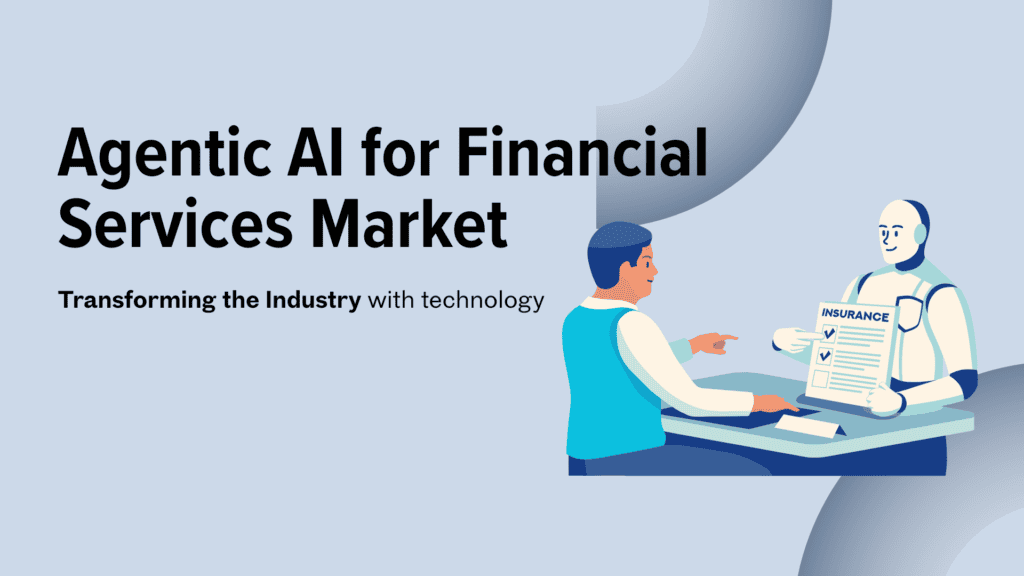Introduction
The Global Agentic AI for Financial Services Market is poised for exponential growth as institutions embrace automation and intelligent decision-making to enhance efficiency and compliance. Valued at USD 2.1 billion in 2024, the market is projected to reach nearly USD 80.9 Billion by 2034, advancing at a strong CAGR of 43.8% between 2025 and 2034. In 2024, North America emerged as the leading region, capturing over 41.4% of the market with revenues of about USD 0.8 billion, supported by early adoption in banking, insurance, and investment sectors.
 +
+
The growth of agentic AI in finance is propelled by its capacity to enhance operational efficiency and responsiveness. Institutions increasingly seek autonomy in decision-making where the AI can detect anomalies, adapt to evolving data, or recommend portfolio shifts without routine human direction .
According to Market.us, the Global Agentic AI Market is set for exceptional growth, rising from USD 5.2 billion in 2024 to nearly USD 196.6 billion by 2034, advancing at a CAGR of 43.8%. North America led the market in 2024 with more than 38% share, generating about USD 1.97 billion, while the U.S. alone accounted for USD 1.58 billion, supported by strong enterprise adoption. This momentum is being fueled by organizations seeking advanced automation and intelligent decision-making capabilities, positioning Agentic AI as a cornerstone of digital transformation strategies.
Investment trends further highlight the growing significance of this technology. In financial services, adoption has accelerated, with usage climbing from 19% to 31% in a short span, reflecting its value in risk management, compliance, and customer engagement. A Capgemini report noted that while only 10% of businesses currently deploy AI agents, as many as 82% plan to integrate them within the next three years, underscoring the widening confidence in this emerging capability.
The broader AI ecosystem is also seeing record levels of capital inflows, with global investments expected to surpass USD 749 billion by 2028. This influx reflects not only the scalability of agentic systems but also their potential to redefine operational efficiency across industries. From automating workflows to enabling real-time decision intelligence, Agentic AI is rapidly evolving into one of the most transformative and fastest-growing technologies of the next decade.
Key Takeaways
- The Global Agentic AI for Financial Services Market is projected to grow from USD 2.1 billion in 2024 to nearly USD 80.9 billion by 2034, registering a strong CAGR of 43.8% during the forecast period.
- In 2024, North America led the market with 41.4% share, generating around USD 0.8 billion in revenue. The U.S. market alone was valued at USD 0.7 billion, with an expected CAGR of 42.5% over the next decade, highlighting its leadership in financial AI adoption.
- By component, the Solution segment dominated with 67.2% share in 2024, reflecting demand for ready-to-deploy AI-driven platforms tailored to financial services.
- By deployment model, the On-Premises segment captured 58.9% share, driven by the need for data security, compliance, and customization within large financial institutions.
- By technology, Machine Learning & Deep Learning held the lead with 34.8% share, supporting advanced analytics, fraud detection, and intelligent decision-making in financial operations.
US Market Size Analysis
The United States has emerged as the leading hub for Agentic AI adoption in financial services, supported by strong investment flows and rapid innovation in AI-driven automation. In 2024, the U.S. market reached a valuation of USD 0.7 billion, with forecasts indicating robust expansion at a 42.5% CAGR over the coming years. This trajectory highlights the country’s pivotal role in shaping advanced AI applications that streamline operations, reduce risks, and enhance decision-making across banking, insurance, and wealth management.

Within the broader regional context, North America captured 41.4% of the global market share in 2024, with revenues totaling USD 0.8 billion. This dominance reflects the presence of advanced financial ecosystems, strong regulatory frameworks supporting innovation, and high adoption of AI by leading banks and fintech players. The region’s readiness to integrate cutting-edge agentic AI solutions into customer service, fraud detection, and personalized financial planning further consolidates its leadership in this transformative sector.

Analysts’ Viewpoint
Investment opportunities in this market arise from the increasing need for platforms that seamlessly integrate agentic AI into existing financial infrastructures. There is scope for software providers specializing in AI-driven compliance tooling, fraud detection systems, dynamic advisory services, and autonomous trading solutions. Additionally, investments in data governance, AI ethics, and secure AI deployment are critical as these technologies require robust frameworks to manage risks and regulatory compliance.
The business benefits of agentic AI in financial services are significant. It accelerates decision-making processes while improving the precision of credit risk assessments, fraud detection, and portfolio optimization. Financial institutions gain better visibility into operational risks and customer behavior, enabling more strategic and informed decision-making. By automating time-consuming regulatory compliance tasks, agentic AI also lowers costs and minimizes errors, providing a competitive edge in an increasingly tight market.
The regulatory environment for agentic AI adoption is rigorous and continuously evolving. Financial institutions must navigate complex frameworks related to data privacy, explainability, auditability, and risk management. Regulators emphasize transparency and traceability of AI decisions, especially in high-risk areas like credit approval and anti-money laundering. Institutions are expected to embed compliance controls within AI workflows and maintain human oversight to mitigate ethical and legal risks, thus balancing innovation with responsibility.
Driver Factor
Enhanced Operational Efficiency and Cost Reduction
Agentic AI boosts financial institutions’ operational efficiency by automating complex, data-heavy tasks such as fraud detection, credit scoring, and regulatory compliance. This automation reduces reliance on manual human intervention, allowing staff to focus on more strategic and value-adding activities. As a result, banks and financial services save operational costs while also minimizing errors and risks tied to manual processing.
Agentic AI’s ability to learn and adapt in real-time further streamlines workflows and accelerates decision-making, which is critical in fast-paced financial environments. This efficiency advantage is fueling strong market adoption and investment growth in the financial sector. The reduction in operational costs combined with improved accuracy makes Agentic AI a powerful tool for financial service providers looking to maintain competitiveness.
By reallocating human resources from routine tasks to innovation, institutions enhance productivity and service quality. This driver is central to the projected rapid growth of the Agentic AI market in finance and is supported by an increasing number of institutions embracing AI-driven automation to stay ahead in dynamic markets.
Restraint Factor
Ethical and Governance Challenges
The autonomous decision-making capability of Agentic AI raises significant ethical concerns. As AI systems increasingly act with minimal human oversight, issues of accountability, transparency, and fairness come to the forefront. Financial institutions must navigate the challenge of ensuring that AI-driven decisions, such as credit approvals or risk assessments, comply with regulatory standards and ethical norms. There is a risk that AI systems could perpetuate biases present in historical data or make opaque decisions that are difficult to explain to regulators and customers.
Establishing robust governance frameworks becomes essential to monitor AI actions, maintain audit trails, and allow human override when necessary. Without strong governance, the use of Agentic AI can lead to regulatory penalties, loss of customer trust, or systemic risks. The complexity in balancing innovative AI applications with ethical responsibility and regulatory compliance restrains the widespread adoption of fully autonomous agentic systems in finance.
Opportunity Analysis
Transforming Customer Interactions
Agentic AI offers a major opportunity to revolutionize how financial institutions engage with their customers. By analyzing massive amounts of data, AI agents can provide highly personalized financial advice and proactive management tailored to individual client behaviors and goals. This level of personalization helps build deeper customer trust, enhances loyalty, and improves satisfaction by delivering real-time, relevant guidance that adapts over time.
Moreover, Agentic AI can unify customer service across channels, offering consistent support experiences and reducing wait times. This transformation allows banks and fintech companies to scale personalized financial coaching, making sophisticated advisory services accessible to a broader population. This opportunity opens the door for new business models centered on customer-centric, AI-driven financial solutions that stand out in a competitive landscape.
Challenge Analysis
Data Privacy and Integration Complexity
A significant challenge in implementing Agentic AI in financial services is handling sensitive customer data securely while meeting strict privacy regulations like GDPR and CCPA. Since these AI systems require extensive data access to function effectively, they heighten risks of data breaches or compliance violations if not properly governed. Securing data and ensuring that AI agents operate within legal limits is complex and resource-intensive.
Additionally, many financial institutions face technological hurdles due to siloed legacy systems that inhibit seamless integration of AI capabilities. Fragmented data across departments limits the AI’s ability to deliver unified insights and accurate decisions. Upgrading infrastructure and overcoming legacy constraints demands substantial investment and coordinated change management, which can delay or limit Agentic AI deployment. These operational and regulatory challenges present ongoing barriers that require a strategic approach to overcome.
Key Market Segments
By Offering
- Solution
- Data Integration
- Predictive Analytics
- Autonomous Decision-Making
- Automation of Routine Tasks
- Others
- Services
- Professional Services
- Managed Services
By Deployment
- Cloud Based
- On Premises
By Technology
- Machine Learning & Deep Learning
- Computer Vision
- Natural Language Processing (NLP)
- Blockchain-Enabled AI
- Others
By Application
- Personalized Financial Advisory
- Fraud Detection and Prevention
- Automated Trading Systems
- Customer Service Automation
- Risk Management
- Loan and Credit Underwriting
- Portfolio Management
- Others (Regulatory Compliance, Insurance Claims Processing, etc.)
Top Key Players in the Market
- Akira AI
- Everest Global, Inc.
- UiPath
- Aisera
- Cognizant
- International Business Machines Corporation (IBM)
- Anaptyss
- Zetaris
- moData
- Endava
- Others
Source of Information – https://market.us/report/agentic-ai-for-financial-services-market/












